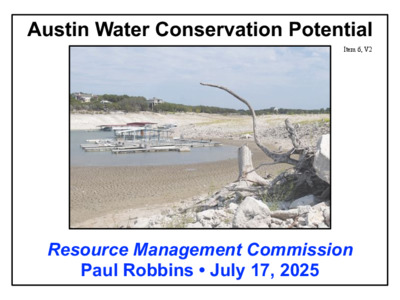Item 6- Water Conservation Presentation, V2 — original pdf
Backup

Austin Water Conservation Potential Resource Management Commission Paul Robbins • July 17, 2025 Item 6, V2 Stress on Highland Lakes Water Supply Lake Levels Adjusted for 1950s Drought Lake Levels Adjusted for 1950s and 1700s Drought Lake Levels Adjusted for Drought and worst global warming scenario Sedimentation Met Demand 2023 2030 2040 2050 2060 2070 2080 Water Supply Left/Unmet Demand t e e F - e r c A 1,400,000 1,200,000 1,000,000 800,000 600,000 400,000 200,000 0 -200,000 -400,000 -600,000 With Maximum Drought, Global Warming, Sedimentation, and increasing population, the Highland Lakes could be dry by 2040 Average temperatures have spike since 2009. Heat and drought influenced water conservation policy. On June 15, 2025, the Lakes Were Only 53% Full. Watering restrictions, building codes, efficiency mandates, rebates, education programs, and higher water costs have contributed to dramatic reductions in per capita water use. Some assume it can go no lower. New Programs and Strategies COMMERCIAL IRRIGATION RATES Other Texas Cities 12 to 122% Higher Than Normal Commercial Rates Austin 2% Discount Originally recommended in 2007 COMMERCIAL LANDSCAPE REBATES In Austin, Residential landscape rebates are very expensive and rarely used. Commercial landscapes use 9 X as much water as Residential, so retrofits may be more cost effective – particularly coupled with high irrigation rates. COMMERCIAL INSPECTION FINES Landscapes since 2014 Car Washes since 2014 Cooling Towers since 2018 20% Non-Compliance – 68 Million Gallons/Year AGGRESSIVE REBATE PROGRAM FOR COMMERCIAL CLOTHES WASHERS AND DISHWASHERS About 10,000 Commercial Clothes Washers and Dishwashers in Austin. Clothes Washers: as much as 69% savings. Dishwashers: as much as 75% savings. But almost no rebates between 2021 and 2024. BUCKS FOR BUSINESS COMMERCIAL REBATE PROGRAM Replacing toilets in volume Poor participation in recent years until new staff person and third-party vendor. 24 million gallons saved in 2024, 6 X the previous 3 years combined. Recycling car wash water MANDATORY TOILET CHANGEOUT 140,000 old units left in 2012. Retrofits should be required. Originally recommended in 2007 MANDATORY SOIL DEPTH IN NEW SUBDIVISIONS Placing 6 inches of soil on disturbed ground enhances moisture retention (like a sponge). Originally recommended in 2007 OLD PIPE REPLACEMENT In 2023, 12.5% of Austin’s water leaked. Most was from old cast iron and polybutylene pipe. It has been getting worse since 2007. Replacing cast iron and polybutylene would require $1.6 billion in overnight costs. But only $11 million/year is typically spent to replace ≈6 miles of pipe. (Money is being borrowed to accelerate PB replacement.) Mass replacement not cost effective unless viewed on a 100-year timeline. Pipes can last more than a century. Equipment in water treatment plants may last only 20 years. • Savings from water processing cost. • Savings avoiding new treatment plant capital and O&M. • Savings from new water supply purchases. • Savings from more customers in served by same pipe. RECLAIMED WATER Despite the number of reclaimed water customers growing by almost 4 times since 2011, the actual 2023 volume sold remained the same. Only 6% reclaimed. But at full potential, it could supply 715,000 more Austinites. Building a new reclaimed water utility is expensive. One way to lower costs is to supply the largest consumers. In Singapore, the utility supplies reclaimed NEWater to microchip factories. Austin wafer fabs use 7% of the city’s water. This map shows a proposed line to Samsung, picking up other large customers along the way. LOCAL DATA COLLECTION • End Use Surveys Number of customers with various water-using appliances and machinery (and their efficiencies). • Saturation Surveys How much water is used for various purposes (landscapes, clothes washers, etc.). • Map of Reclaimed Water System The most current one is 11 years old. The most essential planning data is lacking